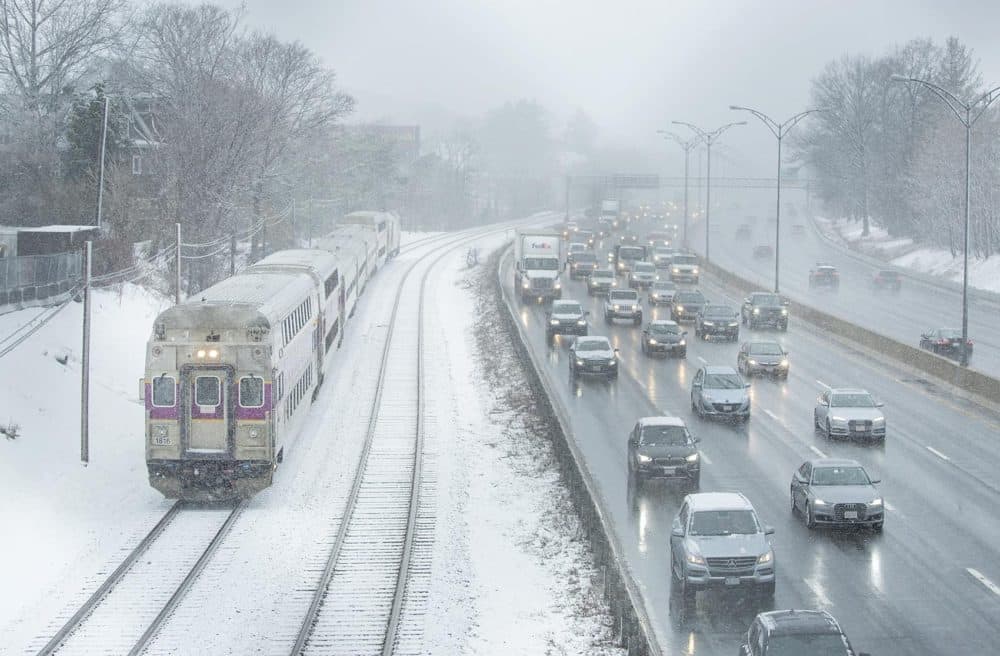Advertisement
Commentary
Boston Has The Worst Traffic In The Nation. Raising MBTA Fares Won't Help

A new study out this week confirmed what anyone who drives on Massachusetts’ roads at rush hour already knew: Our traffic is the pits. In fact, it’s the slowest in the nation during peak commuting periods.
And that’s just the beginning of the problems with transportation in the commonwealth. The transportation sector is the state’s biggest contributor to climate change (in terms of greenhouse gas emissions), which threatens our coastal communities today and all of us in the years to come. Meanwhile, for many of us, there’s simply no good alternative to stressful, time-consuming commutes, whether we live near Route 9 in Hadley or Route 1 in Saugus.
To address our transportation challenges, we need to come together behind common solutions. So why is Gov. Charlie Baker — a politician known for his ability to bring people together across the political spectrum — dividing Massachusetts residents when it comes to the MBTA, one of the key tools we have for keeping cars off the road?
The governor’s recent rhetoric suggests there are two kinds of people in Massachusetts: People who ride the MBTA and “taxpayers.”
“Let’s not forget that the taxpayers who never ride the system write a check every year for over $1 billion to the MBTA,” said Baker recently, arguing that the proposed 6.3 percent hike in transit fares is necessary for MBTA riders to pay their fair share.
It is true that there are many Massachusetts residents whose taxes support the T, but who never ride it. However, we all pay taxes to support programs or facilities — like schools and public safety — we might never directly use but benefit the community as a whole. It’s the price of living in a democracy. Our ancestors didn’t call it a commonwealth for nothing.
And the MBTA certainly builds our common wealth. According to a 2018 study by A Better City, the MBTA provides $11.4 billion in economic benefits every year in terms of travel time and travel cost savings, avoided crashes and avoided emissions. That’s what most people would call a good investment.
People who ride the MBTA also contribute to the system’s upkeep in ways beyond paying fares. MBTA riders are, after all, taxpayers — paying the same sales taxes as everyone else.
... the MBTA provides $11.4 billion in economic benefits every year in terms of travel time and travel cost savings, avoided crashes and avoided emissions
A large share of the sales tax revenue that supports the MBTA comes from the region it serves. Boston alone is responsible for one-fifth of all sales tax revenue in the state, while residents of the 65 cities and towns served by MBTA fixed-route service and 175 served by commuter rail contribute sales taxes of their own. In addition, cities and towns served by the MBTA make direct contributions to the system in the form of local assessments that totaled $170 million in fiscal 2019.
MBTA-riding taxpayers — as well as those who never set foot on a bus or a train — deserve to know that the money they give to the T is spent wisely. But making it even more expensive to ride public transportation is likely to be penny wise and pound foolish.
The proposed 6.3 percent MBTA fare hike is expected to reduce ridership by 1.3 percent. That’s on the order of nearly 5 million rides a year, many of which will instead be taken in a car (or, in the case of people in who rely on public transit to access work, education or health care, not taken at all). Is that good for Massachusetts taxpayers already stuck in traffic or struggling to make ends meet? Or those who want to ensure that their children and grandchildren can live and grow here in a stable climate?
Advertisement
The Baker administration has shown the occasional willingness to embrace big ideas. It recently included a long-awaited connection between the MBTA’s Red and Blue lines in the system’s long-range plan. But too often, whether the issue has been keeping MBTA fares affordable, providing adequate funding for the commonwealth’s 15 regional transit authorities, or uniting people across Massachusetts in a compelling vision of our transportation future, the administration has come up short.
The Baker administration has shown the occasional willingness to embrace big ideas.
Rather than pitting MBTA riders and “taxpayers” against one another, it’s time to focus our attention on transportation policies that can make everyone in Massachusetts better off.
Improving transit service and keeping fares affordable, not just in Greater Boston but across the commonwealth, is a critical first step. We then need to take full advantage of our existing infrastructure — by converting our commuter rail system into a reliable, all-day regional rail network, dedicating street space to bus and bike lanes that can move people more efficiently in our cities, and adopting smart pricing of travel on our congested highways — to provide Massachusetts residents with more options and reduce the impact of transportation on our environment.
Massachusetts won’t solve our transportation challenges by creating divisions between us and them. There is only “us.” Gov. Baker should drop the divisive rhetoric and bring residents together behind a vision of a clean, efficient and effective transportation system.
